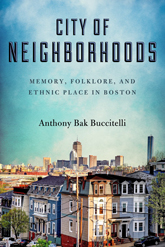|
City of Neighborhoods
Memory, Folklore, and Ethnic Place in Boston
Anthony Bak Buccitelli
Folklore Studies in a Multicultural World
How Boston’s Southie can be both “Irish” and multiethnic
East Boston has long been known as an Italian neighborhood and Southie as an Irish one, while nearby North Quincy has seen in recent decades an influx of Chinese Americans and immigrants. Such urban spaces in America can become intimately intertwined with ethnic identities (Little Italy, Greektown, Chinatown, Little Havana). Yet local residents often readily acknowledge an underlying diversity—both historically and as a result of more recent changes—that complicates such stereotypes.
Digging into the ever-shifting terrain of American ethnicity and urban spaces, Anthony Bak Buccitelli investigates folk practices, social memory, and local histories in three Boston-area neighborhoods. He looks at the ways locals represent their neighborhoods and themselves via events, symbols, stories, and landmarks, from the shamrock to the Chinese flag, whether the St. Patrick’s Day parade in Southie or the Columbus Day parade in East Boston, from urban graffiti and websites to the Dorchester Heights Monument. City of Neighborhoods exposes the processes of selection and emphasis that produce, sustain, challenge, and change understandings of urban spaces as ethnic places.
 Anthony Bak Buccitelli
is an assistant professor of American studies and communications at Pennsylvania State University, Harrisburg. He grew up in Hingham, Massachusetts.
Anthony Bak Buccitelli
is an assistant professor of American studies and communications at Pennsylvania State University, Harrisburg. He grew up in Hingham, Massachusetts.
Praise
“Deftly explores key ways in which who we are is inseparable from where we are. The neighborhoods Buccitelli examines are not simply parts of a city; they are complex systems of memories, symbols, stories, celebrations, tribal landmarks, claims and counterclaims, all coming together to express distinct ethnic identities in everyday life.”
—Kent C. Ryden, author of Mapping the Invisible Landscape: Folklore, Writing, and the Sense of Place
“This fascinating deep-dive into historically ethnic neighborhoods reveals that old stereotypes have been supplanted by vibrant, multiethnic neighborhoods that now use ethnicity as a means for inclusion. A riveting, insider look into what really happens in Boston’s diverse neighborhoods.”
—Timothy Tangherlini, University of California, Los Angeles
Of Related Interest
|

Improvised Adolescence
Somali Bantu Teenage Refugees in America
Sandra Grady |

Living Black
Social Life in an African American Neighborhood
Mark S. Fleisher |
|

Larger images
April 2016
LC: 2015036810 F
240 pp. 6 x 9
3 b/w illus., 3 maps
|

